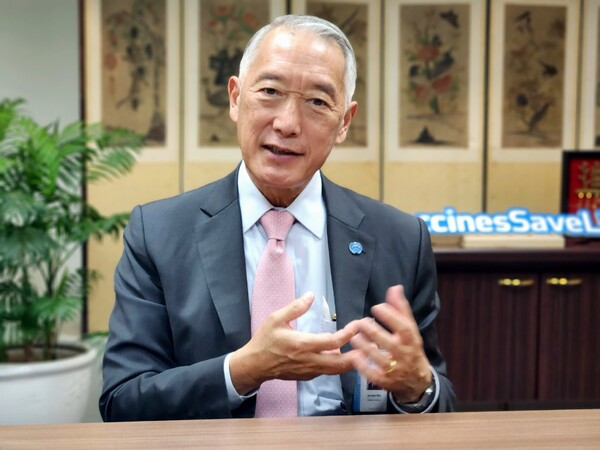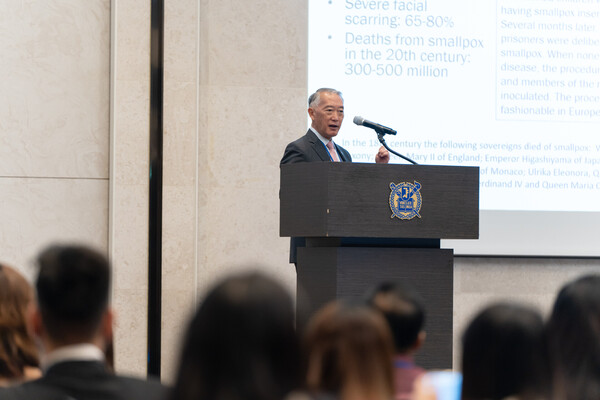After the devastating impacts of the Covid-19 pandemic, many countries are striving to achieve vaccine sovereignty and Korea is one of them. However, the WHO Pandemic Treaty which is carded to be further discussed next week in a UN High Level Meeting, has drawn the attention of Korean vaccine manufacturers due to a contentious clause regarding benefit sharing based on a joint global response in pandemics.
Referencing the COVAX initiative, which also fell prey to many criticisms for failing to deliver Covid-19 vaccines quickly, the Director General of the International Vaccine Institute (IVI), Dr. Jerome Kim, noted that the treaty is not perfect and will likely follow the same learning curve as COVAX.

With the IVI opening its doors for the 22nd International Vaccinology Course on Monday, Dr. Jerome Kim spoke about the evolution of the program and other pressing issues facing vaccine developers such as the WHO Pandemic Treaty, climate change-related issues, and immune bridging studies.
“The course might have started as a way to train some of the International Vaccine Institute’s (IVI) collaborators in the basics of vaccinology but it has now evolved into a much more comprehensive course 22 years later,” said Kim. “We train participants on the epidemiology of different diseases and the vaccine manufacturing requirements from a laboratory, clinical, regulatory, and implementation perspective, with a focus on international standards.
Vaccine Sovereignty vs. Joint Global Response
The UN High-Level Meeting on pandemic prevention, preparedness, and response (PPPR) will soon be convened on September 20 to discuss PPPR equity through governance and capacity building. However, due to the clause regarding pathogen access and benefit-sharing (P-ABS), some countries are skeptical of signing on to this treaty.
The draft of the treaty has not yet been finalized but the P-ABS of the pandemic treaty is expected to follow a framework that would grant access to 10-20 percent of real-time pandemic vaccine production to WHO to support the vaccine’s equitable distribution. Alternatively, a benefit-sharing arrangement can be integrated into purchase agreements such as the donation of products outside the vaccine manufacturer’s territories or subcontracting, licensing, or technology transfer incentivizes to increase the production of the vaccine.
Although IVI is not directly affected by this issue, Kim still weighed in on the matter.
“IVI’s approach is to publish a study rather than patent the technology so we operate on a non-profit basis which is very different from pharmaceutical companies which need to recover their investment,” said Kim. “We use our expertise to engage in technology transfers so that companies like Incepta Pharmaceuticals in Bangladesh or Biovac in South Africa, will be able to manufacture a cholera vaccine that has the same characteristics as the vaccine manufactured by EuBiologics in Korea.”
Leaning on his experience from the Hepatitis A vaccine trial conducted in Thailand, he shared that Thailand enrolled 40,000 high school children in a study to prove that a Hepatitis A vaccine was safe and efficacious but the country failed to benefit from the vaccine as they could not afford it.
However, he explained that the Thai government learned from this experience and demanded an access agreement before starting the HIV clinical trial. In exchange for providing 16,000 participants for the trial and some of the clinical staff, Thailand received one letter from Sanofi and another from VaxGen for the provision of the developed vaccine for two of its provinces, vaccination of the placebo recipients, the vaccine at a reasonable cost for the country and the technology transfer of the vaccine.
“It’s complicated and maybe the pandemic treaty doesn't have all the answers but just like COVAX was a learning experience, I think the same will be true for the pandemic treaty,” shared Kim. “The first version of the treaty may not work perfectly, but hopefully we'll be able to look at what went wrong and fix it to avoid another pandemic.”
‘Not establishing correlates of protection for Covid-19, a missed opportunity’
“In standard phase 3 trials, we enroll vaccine and placebo recipients, and depending on the incidence of disease in the population, the required cohort can be very high,” explained the Director.
For example, the original Covid-19 trials consisted of approximately 20,000 to 40,000 participants to have adequate statistical power to determine whether the vaccine worked. However, with a correlate of protection such as a neutralizing antibody, you can design the study to compare vaccine X – which is usually approved– to a new vaccine Y by comparing the correlate of protection which can be a lab test or biomarker, which is already known to induce 80-84 percent of vaccine X recipients at a specific titer.
In other words, immune bridging studies like this aim to establish non-inferiority rather than proving statistical significance in conventional phase three trials, allowing a smaller cohort of 600 participants compared to 30,000, explained Kim.
This bodes well for the CEPI-100 days mission but he noted that the Covid-19 vaccine trials which didn't collect the blood samples to establish correlates of protection, was a missed opportunity. Consequently, T cells, another important factor that could potentially provide clues as to why the newer Covid-19 variants are not causing high mortality rates like the earlier variants, can no longer be proven.
“It was a pennywise and pound foolish decision which emphasizes the importance of considering the data needed in the future when designing a scientific trial,” said Kim. “Although a difficult job, we proved that it’s doable like in the HIV clinical trial in Thailand but you have to train people to do it.”
He further revealed that from an industry perspective, companies aren't necessarily interested in correlates as it can allow other companies to skip phase three trials and develop a vaccine faster. However, he explained that CEPI is still banking on using correlates of protection to facilitate immune bridging studies to make the clinical trial shorter, faster, and cheaper but equally valid.
Kim explained that IVI has been working with CEPI to liaise with regulatory bodies, key opinion leaders in regions, and institutional review boards (IRB) that look at the ethics of different clinical trials. In particular, he elaborated on work done between both organizations including setting up standards for the Middle East Respiratory Syndrome (MERS), laboratory analyses, working together on different Covid-19 vaccines, and a project on the Chikungunya virus. Based on the growing number of projects between the two, Kim mentioned that CEPI is now IVI’s largest funder.
However, Kim still noted the need to not only establish correlates but also analyze these correlates in a way that meets international standards so they can be compared between labs. He also added that regulators should also be prepared to approve vaccines outside of the country of manufacture as it can delay access to the vaccines in the country where needed the most.
“The U.S. doesn't have Ebola so we think that the trial should first be allowed in Kenya and these preparations are equally important to having a correlate,” asserted Kim.
Climate impacts healthcare outcomes more than the reverse
Referring to his remarks on day one of the IVI Vaccinology Course, Kim pointed out that climate change and global health were inextricably linked and should work together, referencing two global agreements that aim to address these issues, namely the Paris Agreement and the Pandemic Treaty.

“Together climate and health pose some of the greatest challenges to humanity so it's impossible to just focus on each individually,” said Kim. “I think the Paris Agreement can positively impact health in cases of climate-induced changes such as water-borne diseases if they can remediate the problems."
However, the Pandemic Treaty may not necessarily affect climate change in the same way as it really is a preventative measure against things that are occurring because of climate change rather than the reverse, he said.
Fortunately, there are typhoid and cholera vaccines that can be deployed to contain the outbreaks caused by poor sanitation from floods and typhoons or antimicrobial-resistant strains of Salmonella typhi. However, deforestation draws humans in closer contact with animals, thereby increasing the risk of viruses –for which a vaccine has not yet been developed– being transmitted to animals.
On another note, Kim also commented on the scaling of emergency responses from a pandemic to an endemic mode.
“It's a mistake to only think of one way to prevent disease. In the same way that water sanitation and hygiene, as well as vaccines and diagnostics, play a role in cholera prevention, we have to also consider a holistic approach using all the tools at our disposal to prevent a potential ‘tripledemic’ of Covid-19, respiratory syncytial virus (RSV), and flu,” said Kim.
Similarly, as surgeons use masks in surgery not to prevent themselves but rather the patient from contamination, masks should also be worn by the public in this way. However, he admitted that due to the availability of vaccines, the present variants should not be as severe as the Delta or Omicron outbreaks but still warned that those who have been vaccinated or previously infected are not exempt from contracting the virus, and particularly high-risk groups should take all precautions.
Related articles
- 'CEPI’s 100-day mission only a reality if we establish alternative clinical evidence now'
- [Vaccine Innovation] How are vaccines saving us from the silent AMR pandemic?
- [GVIRF 2023] WHO, CEPI, AVMI say establishing regional manufacturing easy but sustaining it difficult
- [Women Leaders in K-Bio] Leadership ‘behind the curtains’ important: IVI’s Deputy Director General
- CHA Vaccine Institute patents Lipo-pam immune enhancer in Canada
- Climate change complicating dengue disease surveillance and vaccine development
- Moderna leaning on immunobridging studies to keep up with virus variants
- EuBiologics signs meningococcal vaccine tech transfers with South African and Russian manufacturers
- IVI to establish the Hong Kong Jockey Club Global Health Institute with various partners
- International Vaccine Institute starts transferring oral cholera vaccine tech to Indian partner

